|
|
|
Sort Order |
|
|
|
Items / Page
|
|
|
|
|
|
|
| Srl | Item |
| 1 |
ID:
177577
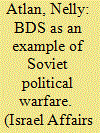

|
|
|
|
|
| Summary/Abstract |
This article seeks to underline the ideological filiation between the principles of Russian political warfare (disinformation, aggressive propaganda, manipulation, distortion, political isolation of the target (politicide), the anti-Zionist propaganda formulated by the Soviet Union and the BDS argument, conceived as a node around which anti-Israeli organisations and structure gravitate. To determine this filiation this article examines step by step; the principles of Russian political warfare; the development of that doctrine as expressed in the anti-Zionist propaganda formulated by the Soviet Union between 1897 and 1991 and finally the modalities of the application of the Russian political warfare in the BDS argument. The findings reveal a twin phenomenon of appropriation; first an appropriation of Russian political warfare as a strategy to delegitimise Israel and second, an appropriation of the arguments produced by the anti-Zionist propaganda formulated by the Soviet Union.
|
|
|
|
|
|
|
|
|
|
|
|
|
|
|
|
| 2 |
ID:
173364
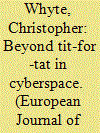

|
|
|
|
|
| Summary/Abstract |
At present, most scholarship on the potential for escalation in cyberspace couches analysis in terms of the technological dynamics of the domain for relative power maneuvering. The result has been a conceptualisation of the logic of operation in cyberspace as one of ‘tit-for-tat’ exchanges motivated by attribution problems and limited opportunity for strategic gain. This article argues that this dominant perspective overlooks alternative notions of how cyber tools are used to influence. This, in turn, has largely led scholars to ignore second-order effects – meaning follow-on effects triggered by a more direct outcome of an initial cyber action – on domestic conditions, institutions, and individual stakeholders. This article uses the case of cyber-enabled political warfare targeting the United States in 2016 to show how escalation can occur as a second-order effect of cyber operations. Specifically, the episode led to a re-evaluation of foreign cyber strategy on the part of American defence thinkers that motivated an offensive shift in doctrine by 2018. The episode also directly affected both the political positions taken by important domestic actors and the attitude of parts of the electorate towards interference, both of which have reinforced the commitment of military planners towards assertive cyber actions.
|
|
|
|
|
|
|
|
|
|
|
|
|
|
|
|
| 3 |
ID:
178557
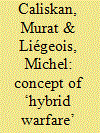

|
|
|
|
|
| Summary/Abstract |
Hybrid warfare has been a popular term that refers to contemporary warfare. Despite the increasing number of critiques, NATO has used the term in its strategic documents and summit declarations. Since concepts are important in shaping our understanding and the way that our forces fight, NATO’s use of a controversial concept has raised some questions. In this context, this paper aims to explore the meaning of the hybrid warfare from the viewpoint of NATO, based on in-depth interviews with NATO officials who have sufficient expertise and experience about the concept. The authors conclude that hybrid warfare is an ambiguous concept which clouds NATO’s strategic thinking and leads NATO to forget the difference between war and peace. Further analysis has revealed that NATO uses this concept as a tool for the strategic communication rather than a military concept.
|
|
|
|
|
|
|
|
|
|
|
|
|
|
|
|
| 4 |
ID:
178551
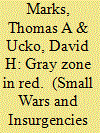

|
|
|
|
|
| Summary/Abstract |
With the United States having shifted its defense emphasis to peer and near-peer rivals, study of irregular warfare has likewise expanded its scope to applicable lessons for the strategic level, within the context of great-power competition. In theory, meanwhile, concern for sub-state actors remains an integral mission for the Department of Defense (DoD), with formal tasking issued to integrate into joint professional military education (JPME) the insights drawn from the last two decades of commitment. The resulting synthesis has led to a discussion of what has variously been termed gray zone conflict, hybrid war, or political warfare.
|
|
|
|
|
|
|
|
|
|
|
|
|
|
|
|
| 5 |
ID:
168266
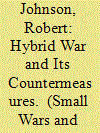

|
|
|
|
|
| Summary/Abstract |
This article examines critically the literature of hybrid war and evaluates the countermeasures often proposed. It explains the concept of hybrid warfare and its varied interpretations, illustrating how it is a manifestation of current anxieties in armed conflict. The selection of the literature is based on works that are referenced, that offer a scientific approach, and which review either the phenomenon of hybrid warfare or its countermeasures empirically. Unscientific works have been omitted. The analysis of the literature presented here shows that the antidotes to ‘hybridity’ lie not in the operational or tactical sphere but in strategic and political domains.
|
|
|
|
|
|
|
|
|
|
|
|
|
|
|
|
| 6 |
ID:
089044
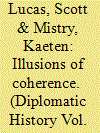

|
|
|
| 7 |
ID:
178555
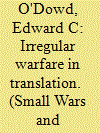

|
|
|
|
|
| Summary/Abstract |
Past efforts by the United States to understand Chinese strategic thought in irregular warfare have relied heavily upon translation. Samuel B. Griffith, a decorated combat veteran, was particularly important in this regard, having served in China even as Mao Zedong emerged. It was the Vietnam War which focused attention on Griffith’s work, even as the same war was tapped by China in its own effort to understand the guerrilla warfare of a new era. Lessons from the Vietnamese struggle against the Americans were carefully assessed for a possible face-off, ironically, not with Washington but with Moscow.
|
|
|
|
|
|
|
|
|
|
|
|
|
|
|
|
| 8 |
ID:
124367
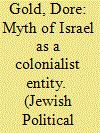

|
|
|
|
|
| Publication |
2011.
|
| Summary/Abstract |
While modern Israel was born in the aftermath of the British Mandate for Palestine, which called for a Jewish national home, its roots preceded the arrival of the British to the Middle East. In that sense Britain was not Israel's mother-country, like France was for Algeria. Indeed, the Jews were already reestablishing their presence independently in their land well before the British and French dismantled the Ottoman Empire. As time went on, it became clear that the British Empire was not the handmaiden of Israel's re-birth, but rather its main obstacle. The accusation that Israel has colonialist roots because of its connection to the British Mandate is ironic, since most of the Arab states owe their origins to the entry and domination of the European powers.
|
|
|
|
|
|
|
|
|
|
|
|
|
|
|
|
| 9 |
ID:
178553
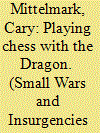

|
|
|
|
|
| Summary/Abstract |
Having engaged in some two decades of irregular war, the United States now finds itself confronted by a resurgent China, determined to utilize asymmetric approaches to both strengthen its grip on power at home and reshape the international environment in its favor. Despite the parameters of Beijing’s strategy having been clearly laid out, Washington has failed to respond in coherent fashion. This reality should be altered by constructing a revitalized approach upon the foundation already put in place through the country’s long, extensive experience in irregular warfare.
|
|
|
|
|
|
|
|
|
|
|
|
|
|
|
|
| 10 |
ID:
170771
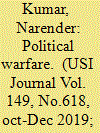

|
|
|
|
|
| Summary/Abstract |
Political warfare is emerging as a preferred tool to fight modern wars. It provides deniability and scope to turn social, political and religious fault-lines into belligerent forces to fight from within. The collapse of regimes, and even states, is a possibility. However, it is difficult to predict the end state or outcome of the war. To fight and defend against such a threat, there is a need for heavy investment in intelligence operations. Best defence is to make institutions of governance and civil society so robust that they do not succumb to the directed attacks by multiple agents of political warfare.
|
|
|
|
|
|
|
|
|
|
|
|
|
|
|
|
| 11 |
ID:
095529
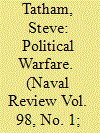

|
|
|
| 12 |
ID:
173156
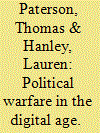

|
|
|
|
|
| Summary/Abstract |
The digital age has permanently changed the way states conduct political warfare—necessitating a rebalancing of security priorities in democracies. The utilisation of cyberspace by state and non-state actors to subvert democratic elections, encourage the proliferation of violence and challenge the sovereignty and values of democratic states is having a highly destabilising effect. Successful political warfare campaigns also cause voters to question the results of democratic elections and whether special interests or foreign powers have been the decisive factor in a given outcome. This is highly damaging for the political legitimacy of democracies, which depend upon voters being able to trust in electoral processes and outcomes free from malign influence—perceived or otherwise. The values of individual freedom and political expression practised within democratic states challenges their ability to respond to political warfare. The continued failure of governments to understand this has undermined their ability to combat this emerging threat. The challenges that this new digitally enabled political warfare poses to democracies is set to rise with developments in machine learning and the emergence of digital tools such as ‘deep fakes’.
|
|
|
|
|
|
|
|
|
|
|
|
|
|
|
|
| 13 |
ID:
072494
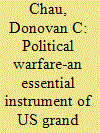

|
|
|
| 14 |
ID:
163951
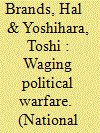

|
|
|
|
|
| Summary/Abstract |
Both Russia and China are governed by opaque, highly centralized and increasingly personalized governments that are well suited to the darker arts of statecraft. Political warfare, for such regimes, is second nature.
|
|
|
|
|
|
|
|
|
|
|
|
|
|
|
|
|
|
|
|
|